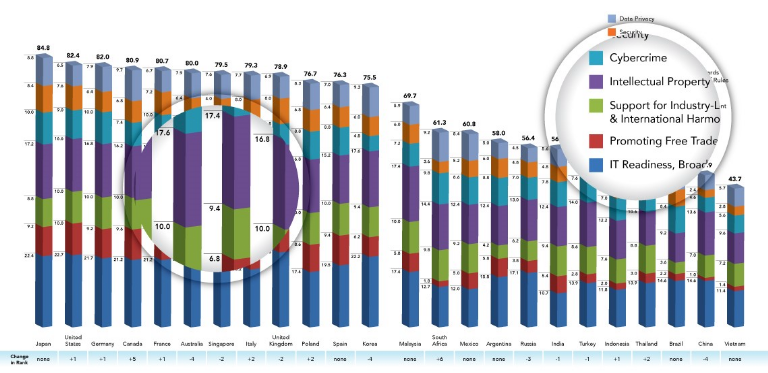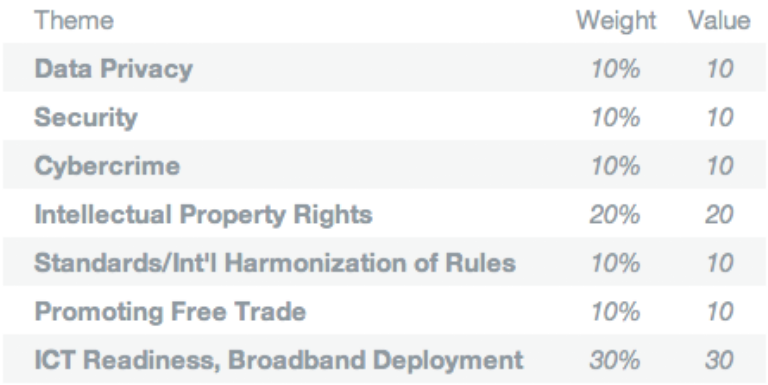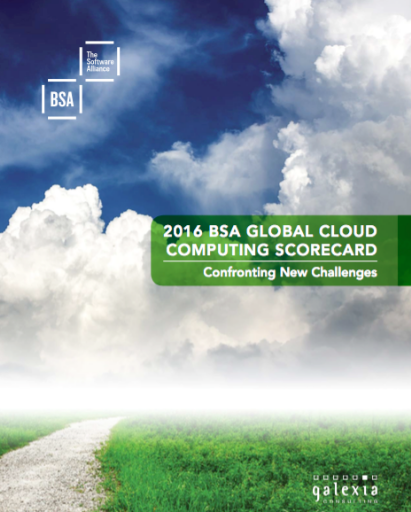 About Us - Galexia News
About Us - Galexia News
3rd Global Cloud Computing Readiness Scorecard released - 27 April 2016
Our latest research report has been released - The 2016 BSA Global Cloud Computing Scorecard (a joint research effort between BSA | The Software Alliance and Galexia) ranks the cloud computing readiness of 24 countries that account for 80 percent of the world’s IT markets. Each country is graded on its strengths and weaknesses in seven key policy areas.. Previous reports were released in 2012 and 2013 and this is a major update.
This year’s results reveal that almost all countries have made healthy improvements in their policy environments since the release of BSA’s previous Scorecard in 2013. But the stratification between high-, middle- and lower-achieving country groups has widened, with the middle-ranking countries stagnating even as the high achievers continue to refine their policy environments..

|
(BSA Global Media Release - 26 April 2016 - Washington) Despite Gains, Countries’ Cloud Computing Policies Leave Much Room for Improvement, BSA Study Shows South Africa, Canada Make Major Strides; Russia, China Push Policies Hindering Technology WASHINGTON — April 26, 2016 — National governments continue to make significant strides in improving the legal and regulatory environment for cloud computing around the globe, but important exceptions exist in several countries that threaten to impede economic growth in those markets, according to a far-reaching study by BSA | The Software Alliance. The 2016 BSA Global Cloud Computing Scorecard ranks the cloud computing readiness of 24 countries that account for 80 percent of the world’s IT markets. Each country is graded on its strengths and weaknesses in seven key policy areas. Cloud computing allows anyone — a start-up, an individual consumer, a government or a small business — to quickly and efficiently access technology in a cost-effective way. These services in return open the door to unprecedented connectivity, productivity and competitiveness. This year’s results reveal that almost all countries have made healthy improvements in their policy environments since the release of BSA’s previous Scorecard in 2013. But the stratification between high-, middle- and lower-achieving country groups has widened, with the middle-ranking countries stagnating even as the high achievers continue to refine their policy environments. “The Scorecard shows that countries are eager to welcome cloud computing and its myriad economic benefits, and many of them are creating a favorable regulatory and legal environment,” President and CEO of BSA | The Software Alliance Victoria Spinel said. “Unfortunately, the Scorecard also shows some countries are heading down a path of treating cloud computing as the next frontier of protectionism. The report is a wakeup call for all governments to work together to ensure the benefits of the cloud around the globe.” In terms of overall ranking, the biggest improvers were South Africa (moving up six places) and Canada (moving up five places). Notably, three of the countries that have trailed in the rankings — Thailand, Brazil and Vietnam — continue to make significant and consistent gains and are closing their gap with mid-tier countries. The world’s major IT markets remained stable with modest gains. Negative trends emerged as well. For example, few countries are promoting policies of free trade or harmonization of cloud computing policies. Russia and China, in particular, have imposed new policies that will hinder cloud computing by limiting the ability of cloud computing service providers to adequately move data across borders. The full, 24-country rankings and detailed findings are available at www.bsa.org/cloudscorecard. |
The BSA Global Cloud Scorecard analyzes the legal and regulatory framework and broadband infrastructure of 24 countries that together make up 80 percent of the global ICT market. The analysis is grouped under seven policy categories that are central to the growth and operation of cloud computing.
The study includes a detailed country-by-country analysis of legislation, regulations, case law, government policy and standards. The assessments include an evaluation of enforcement and implementation of existing laws in each country, as well as an assessment of compliance with relevant treaties and global agreements where applicable. The Scorecard analysis is based upon a combination of published information and statistics and evaluation by independent experts at Galexia.
Each country's score is computed using a 72-item scoring grid and analyses. The scores are derived using a weighted system that allocates different weights to each section/question. A number of basic fact-finding questions are excluded from the scoring system. Each group of questions is weighted to reflect its importance to cloud computing and each individual question is also weighted to reflect its importance within the group. To help with the scoring and usability of the study, the assessments are based on a series of questions that are framed so that a "yes" response reflects a favorable policy setting for global cloud computing. The weights are shown in the table below and the results are available in the downloadable report.

Download the scorecard and 24 country reports:
- BSA’s Global Cloud Computing Score Card (2016) micro-site
- Galexia Micro-site - analytics and graphs showing transition and trends in overall scores across themes and 24 countries (from 2012 to 2016)
![[ Galexia Dots ]](/images/hr.gif)

![[Privacy Impact Assessment (PIA) for Cooperative Intelligent Transport System (C-ITS) data messages]](/public/ssi/pubs/pub_3.png)



 print this page
print this page sitemap
sitemap manage email subscriptions
manage email subscriptions